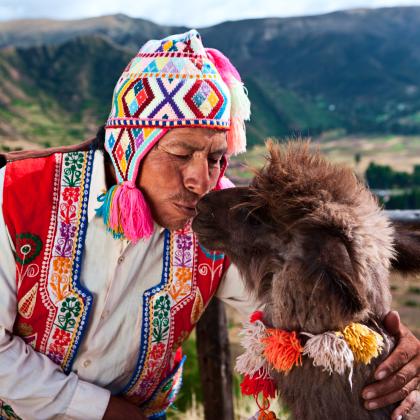Contáctenos
Sandra Razanamandranto
Regional Engagement Director
srazanamandranto@preferredbynature.org
El cambio climático, la deforestación, la pérdida de biodiversidad y la desigualdad social están profundamente arraigados en el comercio mundial de materias primas producidas de forma insostenible, como el cacao, el aceite de palma, el arroz, la soja y la madera. En Preferred by Nature, creemos que un enfoque centrado dará el resultado más sostenible.
Con 30 años de experiencia trabajando con estos recursos esenciales en todo el mundo, hemos decidido concentrarnos en aquellos con mayor potencial de impacto escalable. Para cada área de interés, hemos asignado un responsable y un equipo de expertos en sostenibilidad que harán un seguimiento, medirán y mejorarán día a día nuestros resultados de sostenibilidad, en línea con nuestra estrategia impulsada por el impacto.
Conozca más sobre nuestros servicios de sostenibilidad a la medida
El corazón de nuestra misión es crear impactos sostenibles
870,000+
agricultores, trabajadores y gestores de la tierra pueden confiar que se protegen su bienestar, derechos humanos y herencia cultural
32.4 million
hectáreas de tierra en las cuales la naturaleza y el ambiente son protegidos de la degradación y su conversión a través de la implementación de estándares sostenibles.
32,000+
toneladas de emisiones de CO2 han sido reducidas, disminuyendo su impacto climático

Sandra Razanamandranto
Regional Engagement Director
srazanamandranto@preferredbynature.org
La biomasa es escencial para el desarrollo sostenible, para la reducción de emisiones de carbono y brindar energía renovable. El crecimiento de su uso resalta su importancia para combatir el cambio climático y promover las prácticas sostenibles a lo largo de diferentes industrias.
Conozca másAunque es vital para la seguridad alimentaria, el ganado también contribuye a la deforestación y al cambio climático. Es necesario centrar los esfuerzos en promover prácticas sostenibles que mejoren la biodiversidad, la salud del suelo y el bienestar de las personas y los animales.
Conozca másAbordar el cambio climático es urgente para el desarrollo sostenible. Reducir las emisiones de gases de efecto invernadero mediante estrategias innovadoras es esencial para mitigar su impacto.
Conozca másEl cultivo del cacao tiene un impacto global sobre el medio ambiente, la economía y el clima. Las prácticas sostenibles como la agrosilvicultura pueden mitigar sus efectos negativos, haciendo que el cacao sea relevante para la mitigación del cambio climático.
Conozca másEquilibrar la sostenibilidad económica con prácticas de producción responsables es crucial en la industria del café. Adaptarse al cambio climático al tiempo que se satisface la creciente demanda mundial es esencial para una producción sostenible de café.
Conozca másRevitalizar los ecosistemas es crucial para la salud y la conservación de nuestro planeta. Combatir la deforestación y la degradación con prácticas sostenibles garantiza la recuperación a largo plazo.
Conozca másLa producción de aceite de palma sostiene las economías pero plantea problemas medioambientales y sociales. Las prácticas sostenibles son cruciales para abordar cuestiones como la deforestación y los derechos laborales.
Conozca másLa producción de arroz tiene un impacto significativo sobre el clima y la naturaleza. Abordar las emisiones, el uso del agua y la deforestación en el cultivo del arroz puede conducir a cambios medioambientales positivos.
Conozca másEl caucho natural es esencial para las industrias, pero contribuye a la deforestación y a la pérdida de biodiversidad. Abordar los problemas de sostenibilidad, como las malas condiciones laborales, es crucial en la producción de caucho.
Conozca másLa soja desempeña un papel vital en la seguridad alimentaria mundial y en la producción de biocombustibles. Hacer hincapié en el crecimiento sostenible es esencial para abordar los retos medioambientales en el cultivo de la soja.
Conozca másLos impactos globales de la madera sobre las personas, la naturaleza y el clima requieren una gestión sostenible. Los bosques son esenciales para la biodiversidad, así como para la conservación del suelo y el agua.
Conozca másLa sostenibilidad de la industria de los viajes se cruza con la conservación del medio ambiente y la preservación cultural. El consumo responsable y el apoyo a las comunidades locales son cruciales para los viajes sostenibles.
Conozca másNuestra misión se extiende más allá de estas áreas de interés a cualquier cultivo o producto con potencial de impacto sostenible. Apoyamos proyectos de conservación y restauración de ecosistemas en todo el mundo y ayudamos a las empresas a adaptarse a las cambiantes normativas.
Conozca más
Pequeños pasos nos llevan a un gran cambio y toda contribución es valiosa.